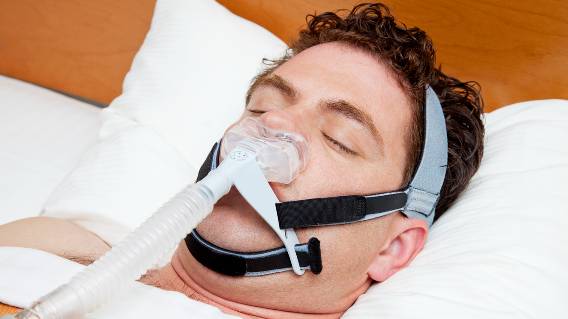US Task Force Doesn’t Recommend Sleep Apnea Screening
Editors carefully fact-check all Drugwatch.com content for accuracy and quality.
Drugwatch.com has a stringent fact-checking process. It starts with our strict sourcing guidelines.
We only gather information from credible sources. This includes peer-reviewed medical journals, reputable media outlets, government reports, court records and interviews with qualified experts.

Medical providers don’t have to conduct preventative screening for obstructive sleep apnea, according to the U.S. Preventive Services Task Force.
“The current evidence is insufficient to assess the balance of benefits and harms of screening for OSA in the general adult population,” the USPSTF said in its recommendation published in JAMA on Nov. 15.
The 2022 recommendation is an update to the task force’s 2017 recommendation. In 2017, the USPSTF found insufficient evidence to recommend screening. In the five years since, there hasn’t been any new evidence presented for the task force to change its stance.
Currently, primary care physicians don’t conduct preventative screening for general population adults. Sometimes, they may refer patients to specialists if the patient complains of symptoms that are indicative of obstructive sleep apnea.
What Is OSA?
Obstructive sleep apnea, also called OSA, occurs when airway obstructions cause a person to stop breathing several times a night. Symptoms include snoring, daytime sleepiness and poor concentration.
The disorder affects about 14% of men and 5% of women aged 30 to 70 years old, according to studies cited by USPSTF. Left untreated, OSA can lead to complications such as Type 2 diabetes, cardiovascular disease and cognitive impairment.
CPAP is the first line of treatment for OSA. Generally, CPAP side effects are mild and go away after a patient gets used to treatment. But in 2021, Philips recalled its CPAP, BiPAP and ventilator machines after the company found exposure to degraded sound abatement foam in the machines could increase the risk of cancer and other illnesses.
The recall led to hundreds of CPAP lawsuits that claimed the devices caused users to develop cancer and respiratory illnesses.
Expert: ‘Benefits Appear to Outweigh Risks’
Not all experts agree with the USPSTF’s recommendation, and other agencies have slightly different views on whether preventative screening is valuable.
“I disagree with the recommendation to no longer screen for OSA in people who do not present with symptoms,” licensed respiratory therapist MaryAnn DePietro told Drugwatch. “Some individuals may not be aware they snore, gasp for air or have other symptoms often only noticed by a sleep partner. For example, people who sleep alone in their bed may be unaware they have these symptoms.”
Preventative screening by primary care physicians is typically done with a series of questionnaires that ask patients about their sleep habits and other issues they may be having with daytime sleepiness, high blood pressure, snoring or other symptoms of OSA.
A simple screening questionnaire could prevent patients unaware of symptoms from suffering complications associated with OSA. In these cases, the “benefit appears to outweigh the risk” because there are virtually no harms to that type of screening, DePietro said.
Other OSA Screening Recommendations
Other agencies have their own recommendations for OSA screening.
The U.S. Department of Veterans Affairs guidelines suggest using the STOP questionnaire on patients who report sleep issues. The STOP questionnaire asks questions about snoring, tiredness, high blood pressure and whether anyone has observed the patient stop breathing during sleep. The VA also recommends screening patients with cardiovascular or cerebrovascular issues, congestive heart failure or a history of opioid use for breathing problems.
The American Academy of Sleep Medicine recommends annual OSA screening for high-risk adults, while the American College of Physicians recommends physicians conduct sleep studies on patients with unexplained daytime sleepiness.